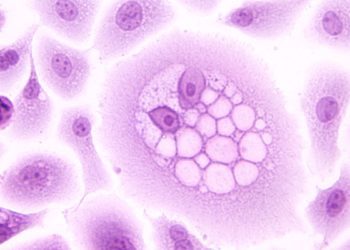Meningococcal group B vaccine effective at preventing meningococcal disease in children
1. In this case-control study, complete vaccination with meningococcal group B vaccine in children had 76% efficacy at preventing disease of any serogroup.
2. Full vaccination with the meningococcal group B vaccine was more effective amongst children younger than 24 months than those more than 24 months old.
Evidence Rating Level: 1 (Excellent)
Study Rundown: Neisseria meningitidis is a gram-negative bacterium that can cause serious diseases, such as meningitis and sepsis, to which children are especially vulnerable to severe illness. In 2013, a new protein-based meningococcal group B vaccine was developed and licensed in the European Union. Since then, observational studies have shown that immunization with this vaccine may be associated with lower cases of disease compared to those who were not vaccinated. However, given the low incidence of severe meningococcal disease among children, precise data characterizing the effectiveness of vaccination amongst this population has been challenging. This study employed a case-controlled design to investigate further the efficacy of this meningococcal vaccine in preventing disease and severe cases amongst children younger than five years old. Results of the study found that total and partial vaccination conferred protection against meningococcal disease of any serogroup. Complete immunization was 76% effective at preventing illness overall (95% Confidence Interval [CI], 57-87%). The vaccine was also found to be more effective at preventing disease amongst children younger than two years old compared to those who were 2-5 years old. Overall, this study supports the effectiveness of this vaccine against meningococcal disease.
Click here to read the study in NEJM
In-Depth [case-control study]: This was a case-control study based in Spain investigating the effectiveness of vaccinating children younger than five years old with the meningococcal group B vaccine. All polymerase-chain-reaction confirmed cases of meningococcal disease amongst children younger than five years old between 2015 and 2019 were included and matched with four controls according to their date of birth and geographical residence. The primary outcome of interest was the effectiveness of the meningococcal group B vaccine in preventing meningococcal disease based on vaccination status. Vaccination status designations included: fully vaccinated, partially vaccinated, vaccinated within 14 days before disease onset, or unvaccinated. The secondary outcome of interest was whether the vaccine was effective at preventing severe disease. Overall, the study included 306 cases of children who had meningococcal disease matched to 1,224 controls. Results of the study found that complete vaccination was 76% effective at preventing disease of any serogroup (95% Confidence Interval [CI], 57-87%), while partial vaccination was 54% effective (95% CI, 18-74). The effectiveness of full vaccination was 74% (95% CI, 43-86) in preventing serious disease. The effectiveness of full vaccination at preventing disease was 88% (95% CI 68-95) amongst those < 24 months old, compared to 53% (95% 1-78%) amongst those > 24 months old. In summary, the study provided evidence that the meningococcal vaccine was effective at conveying protective benefits in preventing disease and serious cases among children. However, the degree of benefit differs based on vaccination status and may offer greater benefits to younger children.
Image: PD
©2023 2 Minute Medicine, Inc. All rights reserved. No works may be reproduced without expressed written consent from 2 Minute Medicine, Inc. Inquire about licensing here. No article should be construed as medical advice and is not intended as such by the authors or by 2 Minute Medicine, Inc.







